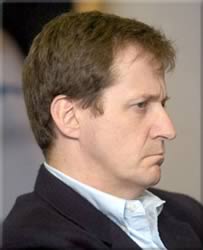Well before he took his turn in the witness chair, we knew moreorless what we were in for – an unapologetic defence of the 2003 conflict.
And so it proved, as Mr Blair insisted he was right to remove Saddam Hussein, that there was no "covert deal" with George Bush, that intelligence was not tampered with, that Parliament was not misled, and for good measure, that he'd do it all again.
If he ever has to choose a song to play at his funeral, it will surely be Robbie Williams' ‘No Regrets.’
But it's only when you look behind the defiant words that you begin to see just how much the former Prime Minister has actually shifted his ground since 2003
Take weapons of mass destruction, for starters. The original, ostensible justification for going to war in 2003 was that Saddam had WMD, some of which were capable of being fired at strategic targets within 45 minutes.
At one press conference I attended around that time, Mr Blair expressed his "100pc confidence" that WMD would be found.
But we now learn from yesterday's evidence that what the former Prime Minister really meant by this was that Saddam merely had the "capacity" to build weapons of mass destruction.
"The decision I took - and frankly would take again - was if there was any possibility that he could develop weapons of mass destruction we should stop him,” he told yesterday’s hearing.
In other words, he didn't have them - something I don't think I can recall the former PM saying at the time.
Then there is the 45-minute claim itself. Mr Blair admits with hindsight that the claim had been misunderstood by the press that it would have been better for the government to have corrected this at the time.
As a matter of fact, former Foreign Secretary Jack Straw had already conceded this point, well before the current inquiry even began
But what this amounts to is an implicit admission that the late weapons inspector Dr David Kelly was right to have raised concerns about the way the 45-minute claim had been presented in his discussions with the BBC journalist Andrew Gilligan which later formed the basis of the BBC’s reports.
I don't recall hearing that either in the summer of 2003, when the Downing Street spin machine was busy hanging poor Dr Kelly out to dry.
Finally there was the new prominence given to the significance of 9/11, with Mr Blair saying his attitude to Saddam had "changed dramatically" after the terror attacks.
"I never regarded 11 September as an attack on America, I regarded it as an attack on us,” he told the inquiry.
Although the 'dodgy dossier' of 2002 had made a half-hearted attempt to draw links between al-Qaeda and Saddam, no-one took this terribly seriously, and it was not an argument that was much heard around the time of the invasion.
Perhaps the fact that he is making it now is an example of what he himself admitted in his TV interview with Fearne Britton last December – that the lack of WMD would have meant that “different arguments” had to be deployed to get us into the war.
Right at the end of yesterday’s hearing, inquiry chairman Sir John Chilcot practically invited Mr Blair to utter the “R” word. His refusal finally provoked an outbreak of barracking from the hitherto well-behaved audience.
Those who hoped that yesterday’s proceedings might somehow heal the divisions of the conflict have already seen those hopes dashed.
